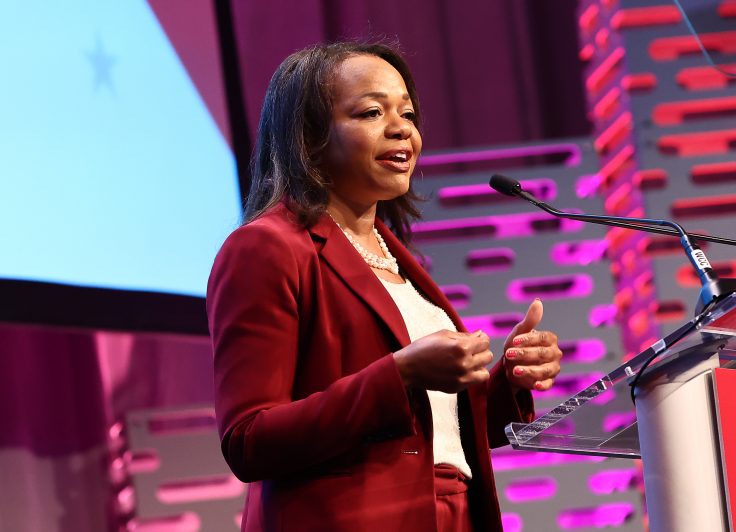Kristen Clarke at center of her own controversy in which she invited author of anti-Semitic conspiracy theory book to speak at Harvard

The Biden administration’s civil rights chief Kristen Clarke is slated to give the commencement address at Columbia Law School, amid a scandal over surging anti-Semitism at the university.
Clarke, the head of the Civil Rights Division at the U.S. Department of Justice, will speak at the law school’s graduation ceremony on May 13, at a time when Columbia is accused of violating the civil rights of Jewish students.
Her address comes as Columbia moved classes online for the rest of the semester after a string of anti-Semitic incidents at the university. Anti-Israel protesters on campus have called for killing supporters of the Jewish state, assaulted Jewish students, burned Israeli flags, and chanted at Jews to “go back to Poland.”
Clarke’s office did not respond to a request for comment. But her speech to the university could raise questions about the Biden administration’s response to the rising anti-Jewish sentiment on college campuses. Clarke is responsible for overseeing Department of Justice investigations into civil rights violations at universities, and pro-Israel leaders have been asking her office to prosecute anti-Semitic incidents at Columbia.
Avi Gordon, the executive director of Alums for Campus Fairness, told the Washington Free Beacon that he is concerned Clarke’s appearance would “tacitly endorse” the anti-Semitism on campus, given Clarke’s role as the Biden administration’s chief civil rights prosecutor.
“We’re hopeful that she’ll be able to address [the campus discrimination] directly and not kind of gloss over it,” said Gordon. “It would be a dereliction of duty to not address it.”
Clarke was at the center of another anti-Semitism controversy during her confirmation process in 2021, when news emerged that she had invited the author of The Jewish Onslaught, an anti-Semitic conspiracy theory book, to speak at Harvard University in 1994. The book accused Jews of orchestrating the slave trade and of colluding to suppress black progress.
Clarke, who served as head of Harvard’s Black Students Association in the 1990s, defended the invitation at the time of the event, calling the book’s author, Tony Martin, an “intelligent, well-versed Black intellectual who bases his information on indisputable fact.”
Years later, during her confirmation hearings, she apologized for the invitation and said it was a “mistake to accept [Martin’s] offer to come and to defend him.”
Pro-Israel and Jewish leaders have asked Clarke’s office to investigate and prosecute anti-Jewish incidents at Columbia and other universities, but she has yet to pursue the cases.
In February, the American Jewish Committee (AJC) asked Clarke to prosecute student activists who shut down a pro-Israel speaker at the University of California, Berkeley. “What happened at Berkeley was a direct assault on American democracy and cannot go unchallenged and uninvestigated,” wrote the AJC in a letter to Clarke. “We urge you to deploy the full resources of the Department of Justice to identify and prosecute those responsible for this outrage.”
President Joe Biden has walked a careful line between condemning the anti-Semitism at Columbia and appeasing anti-Israel progressives in his voting base.
The president called the incidents at Columbia “reprehensible and dangerous” and said they have “absolutely no place on college campuses, or anywhere in our country.” But Biden said he “also condemn[s] those who don’t understand what’s going on with the Palestinians.”
Biden’s response drew comparisons to former president Donald Trump’s infamous statement about a 2017 anti-Semitic rally and counterprotest in Charlottesville, Va., in which Trump denounced bigotry but said there were also “very fine people on both sides” of the protest.
Clarke’s appointment as the head of the DOJ’s civil rights division was politically polarizing. In 2021, Republican lawmakers questioned her nomination, noting that Clarke, as an attorney for the NAACP, had lobbied the DOJ to drop a voter intimidation case against members of the New Black Panther Party in 2009.
Columbia’s main commencement address is being given by Minouche Shafik, the president of the university. But its individual schools will have separate speakers. Columbia Business School’s speaker will be Compass CEO Robert Reffkin, Columbia School of Public Health’s speaker will be National Institutes of Health director Monica Bertagnolli, and Columbia College’s speaker will be CNN anchor Poppy Harlow.














